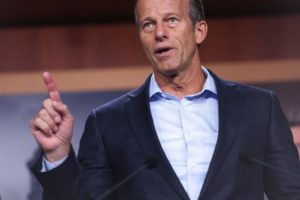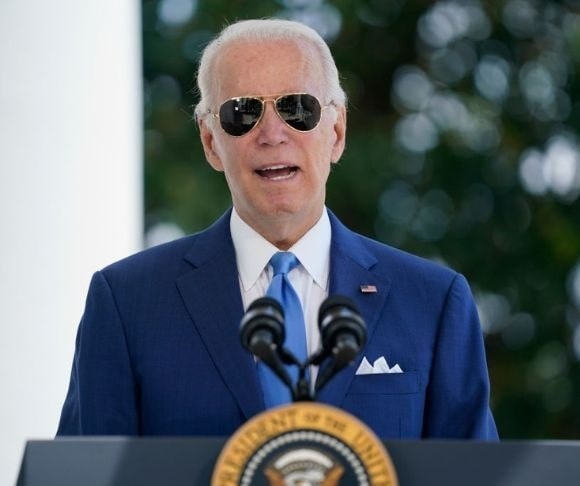Democrats passed their latest green energy and tax bill Sunday (August 7) 51-50 through reconciliation without a single GOP vote. Though a far cry from the Build Back Better deal that Joe Biden and his colleagues initially hoped for, the Inflation Reduction Act is still a win for the president’s legislative agenda. It was also all he was going to get, and he knows it. Biden’s message to Congress leading up to the vote was: “This is the strongest bill you can pass.”
The Long Road
After nearly two years of negotiations and near misses on a progressive climate, health, and tax spending bill, President Biden’s Build Back Better agenda still didn’t seem to be going anywhere. But out of the blue, Sen. Joe Manchin (D-WV), who had killed each attempt at party-line reconciliation in the past, announced an agreement with Senate Majority Leader Chuck Schumer (D-NY), and the Inflation Reduction Act was born.
Shortly after the announcement, Sen. Kyrsten Sinema (D-AZ) declared her opposition to part of the package. Once again, it seemed the Build Back Better agenda was stymied – but the offending carried interest tax change was dropped from the bill, and Sinema signed on. The Senate parliamentarian, the final hurdle once all Democrats were on board, nixed Georgia Democrat Sen. Raphael Warnock’s proposal to cap out-of-pocket insulin costs at $35 a month for those not covered by Medicare, but otherwise declared the bill clear for reconciliation. It was, as the saying goes, all over but the crying, at that point.
Vote-a-Rama
The last chance to stop this train was the 20-hour debate and amendment process. Republicans promised a “vote-a-rama hell,” in which they would tie up as much time as possible forcing votes on amendments. The reasons for this likely varied from one lawmaker to the next, but they probably ranged from mitigating undesired effects to inserting poison pills in hopes of shattering the fragile left-wing coalition to even simply running up the clock out of spite. Sen. Bernie Sanders (I-VT), the Senate’s resident socialist, even got in on the action. One of his amendments would have revived the extended child tax credit that was cut to win over Manchin’s vote. It failed 1-97, however, and he ultimately supported the bill without it.

John Thune (Photo by Kevin Dietsch/Getty Images)
One GOP amendment stood out from the pack. Sen. John Thune (R-SD) managed to add an exemption to the bill’s 15% corporate minimum tax for portfolio companies of investment funds. Seven Democrats joined the full roster of Republicans to pass it 57-43. Immediately after, however, Sen. Mark Warner (D-VA) introduced an amendment – which passed 51-50 with Vice President Kamala Harris’ tie-breaking vote – to replace the exemption from Thune’s amendment with a one-year extension of the $10,000 cap on state and local tax (SALT) deductions, which the party found more palatable.
After hours of debate, the final vote occurred. The results were exactly as expected: All GOP attempts at disrupting Democrat unity failed, and the measure tied 50-50 precisely along party lines with the VP’s vote tipping the scales.
The Tax Bill
The climate, health, and tax bill that emerged on the other end of the reconciliation vote invests more than $300 billion in energy and climate reform – the largest tax investment in the field in US history, falling just short of the $555 billion Democrats originally desired. This section includes funds for “green” infrastructure like solar panels and wind turbines, as well as several tax credits for electric vehicles and making homes more energy efficient. Democrats claim this will lower greenhouse gas emissions by 40% by the end of the decade. That isn’t the 50% Biden aimed for with Build Back Better – but it’s being accepted now as close enough.

(Photo by: Joan Slatkin/UCG/Universal Images Group via Getty Images)
Another campaign issue addressed in this bill is a measure empowering the federal health secretary to negotiate the prices of certain expensive drugs for Medicare. It won’t impact every product or patient, and it won’t happen all at once, either. Ten drugs covered by Medicare will be renegotiated in 2026, then it increases to 20 in 2029. Measures to cap the cost of insulin and to force pharmaceutical companies to offer rebates if prescription prices outpaced inflation were deemed partially out of line with the rules for budget reconciliation by the Senate parliamentarian; they can apply to Medicare patients, but not those with private insurers. Effective 2025, there will be a cap of $2,000 on out-of-pocket prescription drug costs for those on Medicare.
The legislation also creates a 15% minimum tax for corporations making $1 billion or more in income. This is what made Sen. Manchin’s support so shocking, as it has been estimated to hit the coal industry hardest – it’s a measure that can’t be popular in West Virginia, the heart of coal country.
Act of the Century

Chuck Schumer (Photo by Kevin Dietsch/Getty Images)
The House is expected to clear the spending package by Friday, and the president has urged it to act quickly. That this bill will soon be law is now a foregone conclusion, but what remains uncertain is whether the Democrats can spin this whittled-down bill into a big enough win to make a difference come November.
“The Senate is making history,” Schumer said after the bill’s passage. “I am confident the Inflation Reduction Act will endure as one of the defining legislative feats of the 21st century.” And with that, the narrative flipped from “It’s a compromise, but that’s how progress works” to “it’s the act of the century.” While urging Senate Democrats to pass the measure, Biden had admitted it wasn’t all they had hoped for – just the best they could get. Now it’s “the action the American people have been waiting for.”
Today, Senate Democrats sided with American families over special interests,” Biden declared. “I ran for President promising to make government work for working families again, and that is what this bill does – period.” It’s no Build Back Better, but to a president with crumbling public support and a party facing an almost certain midterm shellacking, the Inflation Reduction Act may just be a big enough win to keep their heads above water.




